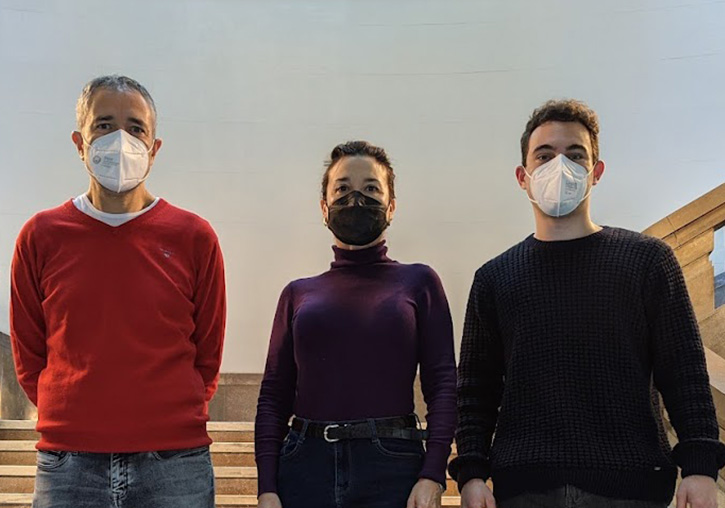Women have more long-term post-COVID symptoms than men
- Scientific Culture and Innovation Unit
- January 24th, 2022

A study carried out with COVID-19 patients admitted to five Spanish public hospitals during the first wave shows that, eight months after discharge, women presented more symptoms of fatigue, dyspnea, pain, hair loss, eye problems, depression and worse sleep quality than men. The work, published in the Journal of Clinical Medicine, is led by the Rey Juan Carlos University (URJC) and the University of Valencia (UV) participates in it.
According to the findings of the LONG-COVID-EXP-CM study, the mean number of symptoms experienced by women eight months after discharge was 2.25 versus 1.5 for men, even though symptoms caused by acute infection were similar at hospital admission. The work has investigated the gender differences in the symptoms related to the disease and its long-term effects after overcoming it and being discharged from the hospital. To date, some studies have suggested that gender could be a specific factor. This study specifically investigates, with the largest cohort to date, this difference and takes into account differences in onset symptoms associated with COVID-19.
Thus, “the COVID-19 pandemic has been related to an increase in gender inequality. Recognising that COVID-19 affects women and men differently is a crucial step towards a better understanding of the pathophysiology and nature of post-COVID sequelae and symptoms and the promotion of individualised health care solutions”, highlighted Esperanza Navarro-Pardo, professor at the Department of Evolutionary Psychology at the UV and participant in the research. “In fact, it is very interesting to see how women survive acute COVID-19 infection to a greater extent than men but develop more symptoms later”, says César Fernández de las Peñas, first signatory of the study and professor at the Department of Physiotherapy, Occupational Therapy, Rehabilitation and Physical Medicine of the URJC.
According to this study on 1,969 patients from hospitals in the city of Madrid, sex does not seem to be related to the type of symptoms at the beginning of the disease, so that the symptoms of COVID-19 at admission were similar in men and women, except for the prevalence of headache as an initial symptom, which was more common in women than in men. This suggests that the initial affectation by COVID-19 is similar in men and women. However, in post-COVID-19 health status, there were more symptoms of fatigue, dyspnea, pain, hair loss, eye problems, depression, and poor sleep quality in women than in men. The female sex appears, therefore, as a risk factor for some specific post-COVID-19 symptoms, such as fatigue, dyspnea and dermatological problems.
In addition, despite the fact that diseases such as hypertension, diabetes or cardiovascular disorders have been related to an increased risk of severe illness or mortality in the acute phase of infection, these variables have not been found to have an effect on subsequent symptomatology. to COVID-19. This could be related to the fact that this disease is more prevalent in men, who show greater severity of infection and higher mortality rate. Also participating in the work on behalf of the UV are the researchers José Martín and ÓscarPellicer, from the Intelligent Data Analysis Laboratory of the Higher Technical School of Engineering (ETSE-UV) and professors from the Complutense University of Madrid (UCM) and Alfonso X El Sabio University (UAX).
The reasons why COVID would affect women more in the long term, the research team points out, would be the biological differences in the expression of angiotensin-converting enzyme-2 (ACE2) and transmembrane receptors between men and women, in addition to immunological differences, for example, decreased production of pro-inflammatory interleukin-6 after viral infection in women. However, the underlying mechanisms need to be investigated.
Methodology
The LONG-COVID-EXP-CM is a multicentre cohort study that specifically aims to investigate gender differences in people hospitalised for COVID-19 infection in Spain, among many other data. Diagnoses were made based on the presence of positive radiological findings on hospital admission and real-time reverse transcription polymerase chain reaction (RT-PCR) analysis of nasopharyngeal/oral swab specimens.
Study participants underwent a telephone interview to find out about any post-COVID symptoms. The Hospital Anxiety and Depression Scale (HADS) and the Pittsburgh Sleep Quality Index (PSQI) were used to assess the presence of symptoms related to anxiety or depression and to determine sleep quality, respectively.
Article: Fernández-de-las-Peñas, C.; Martín-Guerrero, J. D.; Pellicer-Valero, Ó. J.; Navarro-Pardo, E.; Gómez Mayordomo, V.; Cuadrado, M. L.; Arias-Navalón, J. A.; Cigarán-Méndez, M.; Hernández-Barrera, V.; Arendt Nielsen, L. «Female Sex Is a Risk Factor Associated with Long-Term Post-COVID Related-Symptoms but Not with COVID-19 Symptoms: The LONG-COVID-EXP-CM Multicenter Study». J. Clin. Med. 2022, 11, 413. DOI: https://doi.org/10.3390/jcm11020413



















